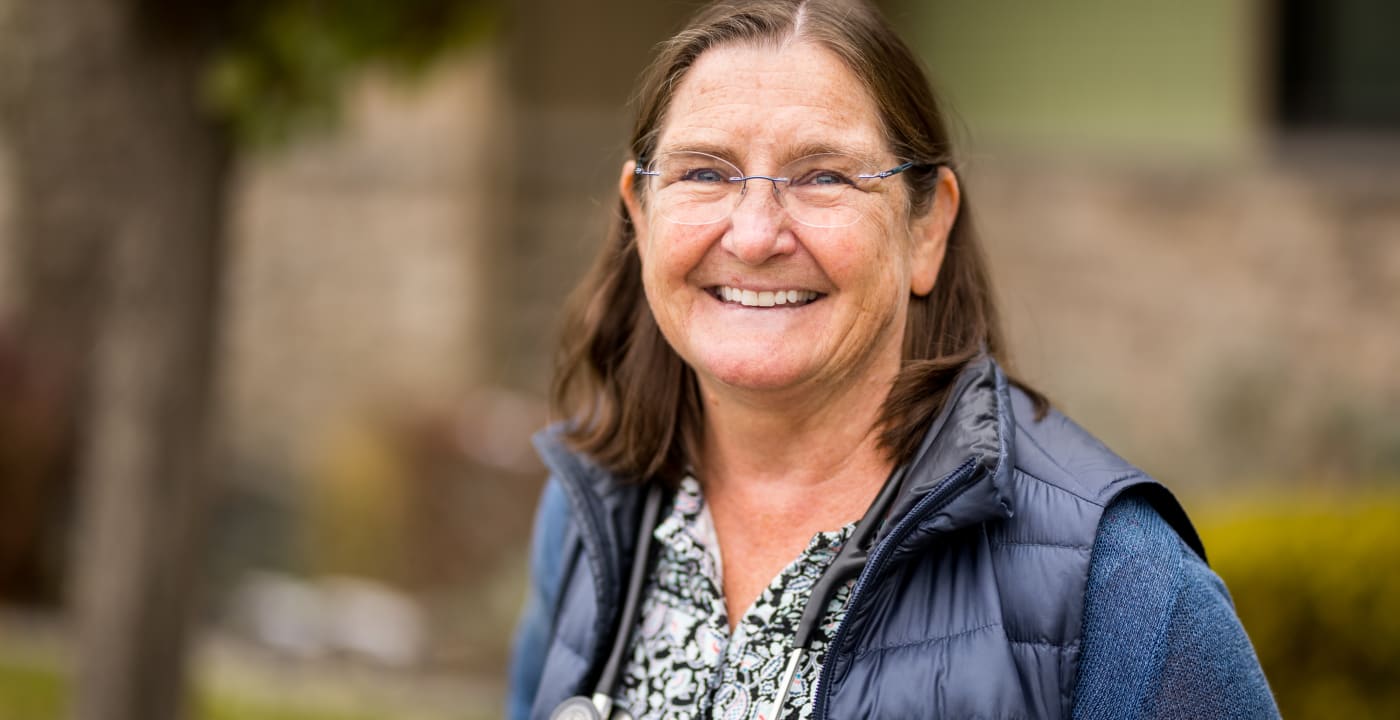Through the decades, Rockwood Clinic provider finds pride in walking alongside patients

Throughout her 35-year career at MultiCare Rockwood Clinic, Beth Orenstein, MD, has seen many things grow and evolve. One of the most satisfying: moving through life alongside her patients.
“It’s a true adage that as you age, your practice ages too,” Dr. Orenstein says. “I now have three-generation families I take care of — some who I delivered as patients and are in their early 30s now. Seeing that whole spectrum: kids to adolescents, then becoming adults, and now they’re in graduate school or having their own kids … it’s a very satisfying relationship.”
She adds that while consistency is a benefit for her longtime patients at the Liberty Lake primary care clinic (and prior practices at the Main and Spokane Valley clinics), it’s also a source of pride for her.
“Just to have them trust in me to care for them for that many years I think is probably what I’m most pleased and proud of,” Dr. Orenstein says. “It’s very fulfilling to go through the bad times and the good times with people over the years.”
The ability to care for all aspects of life, at all ages, is what initially drew her to family medicine. And Rockwood Clinic provided even more opportunity in that realm with its multispecialty approach to care.
Dr. Orenstein joined Rockwood Clinic in November 1987, moving from Minnesota to Spokane with her husband. She initially joined as a family medicine provider at the newly opened downtown Rockwood Main clinic, which at the time housed only a few specialties, including pediatrics. Soon after, she was asked to help open the Rockwood Main urgent care clinic and recruit the original OB/GYN department.
While she says those early days were a bit “trial by fire” with long and busy schedules, the variety her role provided was the perfect fit. The integrated approach allowed for greater camaraderie and collaboration, as well as a sense of comfort in knowing that if you called someone from a different specialty about a patient, they would be there to help.
“Every patient that comes in poses new symptoms and questions and it is always a learning experience,” Dr. Orenstein says. “You still have to listen and gain knowledge and experience with each year that you practice. … We’re trained to take care of many things and can do it well, but we also have our colleagues to advance the patients when needed.”
That camaraderie is a feeling she still finds today.

Dr. Orenstein consults with a team member.
“I think the quality of the providers I’ve worked with over the years and how they’ve cared for patients — you have trust in them,” she says. “That is a very reaffirming position to be in. And of course, there’s the stability and quality of the clinic staff. When they can make your day easier and take care of the patients, that gives you the energy to do what you need to do.”
Dr. Orenstein has faced challenges over the years, too, and recalls the many changes she’s been through with Rockwood: transitioning from a provider-owned clinic to a Community Health Systems employee to joining MultiCare Health System; the original launch of electronic medical records in 2006, which included entering each patient record into the system by hand; and her work on the compensation committee.
Her role has been evolving and growing, just like her patients.
“When I started, there were three other women physicians out of 78,” Dr. Orenstein says.
She recalls when one of these doctors became pregnant and the clinic told her she’d have to pay back her maternity leave when she returned. They came together and told the clinic, “No, no, no. That is not the way that works.”
“Ultimately, we were able to get that changed for everyone and make it equal for everyone,” she says. “The leaders were receptive; they just hadn’t thought about it before. My class in Minnesota was 40 percent women, and then I got here, and it was not that way at all.”
From there, she and her colleagues introduced a part-time option for providers and, later on, job shares for providers to provide more flexibility between work and home life. In more recent years, Dr. Orenstein sat on the provider compensation committee, where she continued working toward her goal of ensuring fair and equitable compensation for everyone.
“That’s been a passion of mine, and I’ve enjoyed working with the administration over the years,” she says, adding that the changes she felt under MultiCare leadership have also been positive. She says transitioning from for-profit to not-for-profit, with a focus on the MultiCare mission of partnering for healing and a healthy future, has been positive for the clinic’s attitude and sustainability.
As she looks to the future, Dr. Orenstein is confident MultiCare is on the right path with its goals to continue growing and increasing access to critical services, and she’s proud to be part of that work.
“And touching tens of thousands of lives over time in a high-quality manner,” she says. “I’m proud of that.”




